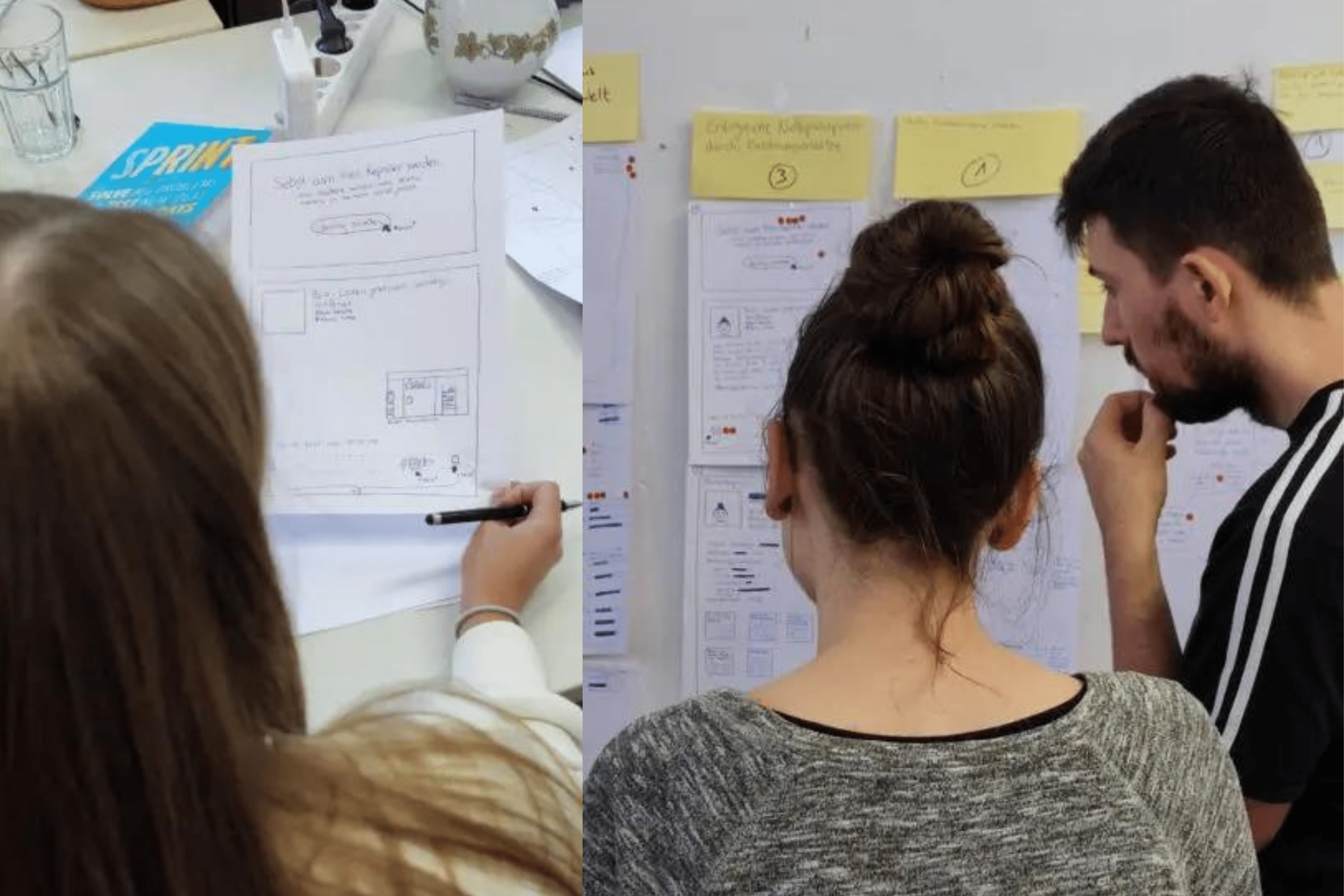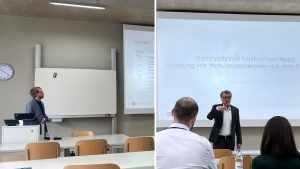Design sprints for the rapid development of products and for testing new business model ideas are considered a particularly modern and promising method. The KomMa-project ‘Location-Based Services in Regional Media Communication’ shows how such design sprints can be implemented successfully in applied research. The Design Sprint aims for rapid prototyping and user testing by shortening months of work and extensive discussion cycles to a single week. In this case, KomMa designed a prototype for a location-based news app with the team of the Berlin startup ‘Cluster’. Locative news as a means of getting local journalism towards digital transformation is considered a highly relevant topic in the international media management research community.
Now, an abstract by the KomMa team has been accepted for the emma 2022 conference, which will be hosted by the Macromedia University of Applied Sciences in Munich. Under this year’s conference title, “Reorganization of Media Industries: Digital Transformation, Entrepreneurship, and Regulation”, KomMa will be able to present findings from the design sprint study. Want a little taste? Here is an excerpt from the abstract:
Abstract
Despite advancing globalization, users’ interests for news concerning their immediate surroundings remain high (Arnold & Wagner, 2018, p. 179), which is why localization technology appears to offer a win-win situation for both media companies and recipients (cf. Frith, 2018; Peters, 2016). However, so far only a very small number of news applications reflect this (Rau & Ehlers, 2018; Schmitz Weiss, 2013). The solution to close this gap might be presented by startups focusing on location-based technologies in local journalism. This contribution outlines the creation of a prototype for a location-based news app by applying a so-called design sprint to the Berlin journalism startup ‘Cluster’. In advance (and to prepare the setting for the sprint) a focus group discussion with local media managers was able to identify, that localizing technologies are of particular use for city districts, the participants saw a great potential for these technologies wherever the publishing houses focus on the readers’ realities by providing possibilities to participate (cf. Thiel & Fröhlich, 2017), as well as by using virtual reality (cf. Raper et al., 2007). Despite the great potential, so far none of the (local) publishers is ready to take the first step (cf. also Ehlers & Rau, 2020).
Curious about the results of the KomMa study? Don’t miss the emma conference, June 15-17, 2022. For more information on EMMA, visit https://www.media-management.eu/emma-conferences/munich-2022/.
Currently, KomMa is working on the full paper of the study and is in great anticipation to present the results at the conference.
If you have any questions or comments, feel free to leave a comment for the KomMa team. See you at emma 2022!
Literatur
Arnold, K., & Wagner, A.‑L. (2018). Die Leistungen des Lokaljournalismus. Publizistik, 63(2), 177–206. https://doi.org/10.1007/s11616-018-0422-4
Ehlers, A., & Rau, H. (2020). Kontext für den (mobilen) Journalismus der Zukunft. https://www.ssoar.info/ssoar/handle/document/68099
Frith, J. (2018). Smartphones as Locative Media. John Wiley & Sons.
Knapp, J., Zeratsky, J., & Kowitz, B. (2016). Sprint: How to Solve Big Problems and Test New Ideas in Just Five Days. Simon and Schuster.
Nielsen, J. (1994). Estimating the number of subjects needed for a thinking aloud test. International Journal of Human-Computer Studies, 41(3), 385–397. https://doi.org/10.1006/ijhc.1994.1065
Peters, C. (2016). Spaces and places of news consumption. https://vbn.aau.dk/ws/files/243773436/Peters_Sage_Handbook_submitted.pdf
Raper, J., Gartner, G., Karimi, H., & Rizos, C. (2007). A critical evaluation of location based services and their potential. Journal of Location Based Services, 1(1), 5–45. https://doi.org/10.1080/17489720701584069
Rau, H., & Ehlers, A. (2018). Acceptance as Core Factor for the Success of LBS. In P. Kiefer, H. Huang, N. van de Weghe, & M. Raubal (Eds.), Adjunct Proceedings of the 14th International Conference on Location Based Services (pp. 207–212). ETH Zurich. https://doi.org/10.3929/ethz-b-000225620
Röper, H. (2020). Tageszeitungen 2020: Schrumpfender Markt und sinkende Vielfalt. Media Perspektiven(6), 331–352.
Schmitz Weiss, A. (2013). Exploring News Apps and Location-Based Services on the Smartphone. Journalism & Mass Communication Quarterly, 90(3), 435–456. https://doi.org/10.1177/1077699013493788
Thiel, S.‑K., & Fröhlich, P. (2017). Gamification as Motivation to Engage in Location-Based Public Participation? In Progress in Location-Based Services 2016 (pp. 399–421). Springer, Cham. https://doi.org/10.1007/978-3-319-47289-8_20
Bilder: Benjamin Rech.






Noch kein Kommentar, Füge deine Stimme unten hinzu!